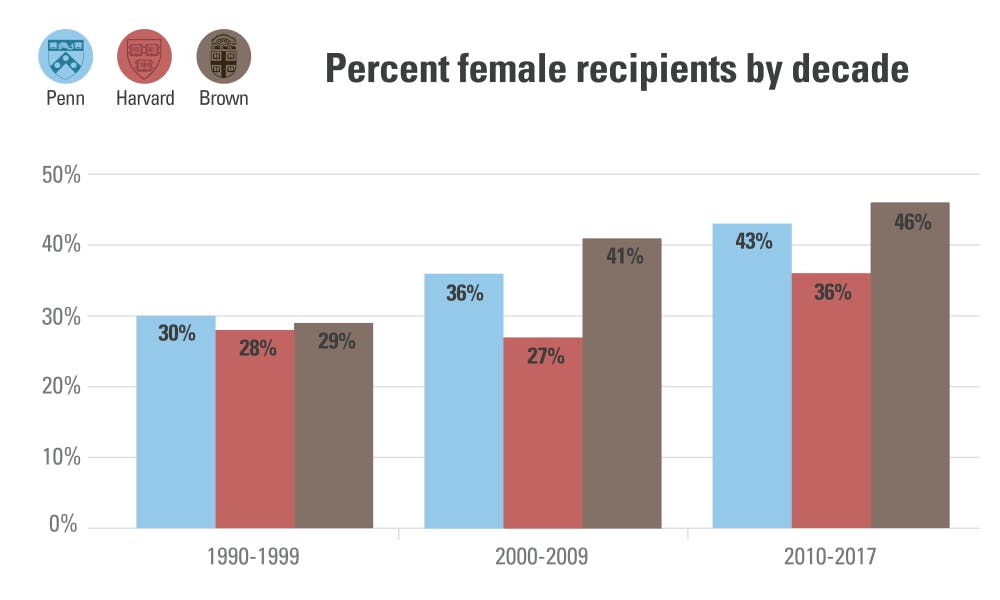
In the wake of Penn's historic decision to rescind the honorary degrees granted to Steve Wynn and Bill Cosby, a range of questions has been raised over whom the University selects to receive honorary degrees and what can prompt the University to revoke that honor.
To provide context on the issue, The Daily Pennsylvanian investigated the history and demographic breakdown of Penn's honorary degree recipients.
Each year, the University offers around seven honorary degrees to figures in academia, research, politics, and the arts. Often, the list of awardees includes notable Penn alumni and donors.
This year's commencement speaker, NBC News’ Chief Foreign Affairs Correspondent Andrea Mitchell, will also receive an honorary degree. She will be joined by seven other recipients, including Annenberg Professor Emeritus Elihu Katz, Philadelphia Orchestra music director Yannick Nézet-Séguin, Harvard University professor of American history and women's history Laurel Thatcher Ulrich, and Chobani CEO and refugee advocate Hamdi Ulukaya.
Including Mitchell, four of the eight honorary degree recipients are women. Last year, Penn awarded four honorary degrees to women and three to men.
Of the 1,740 honorary degrees awarded by Penn between 1757 and 2017, only 164 have been granted to women — 9.43 percent. 1,576 went to men. In 1894, founder and former President of the Penn Museum Sara Yorke Stevenson became the first woman to receive an honorary degree from Penn.
Numbers from other Ivy League universities are similar: at Brown University, only around 10 percent of all recipients of honorary degrees between 1769 and 2017 were women.
Though men are still disproportionately represented among Penn's honorary degree recipients, the gap has been steadily decreasing.
Between 1990 and 1999, roughly 30 percent of Penn's honorary degree recipients were women. For 2000 and 2009, the proportion had grown to 36 percent. So far this decade — from 2010 to 2017 — 43 percent of honorary degree recipients have been women.
Penn's peer institutions are not far off. For the same period, 46 percent of Brown's honorary degree recipients have been women — slightly more than at Penn. At Harvard, 36 percent of honorary degree recipients between 2010 and 2017 were women. Between 1990 and 2009, Harvard awarded around 27 percent of its honorary degrees to women, lower than at Penn, which awarded around 33 percent of honorary degrees to women over the same time period.
Besides Wynn and Cosby, both of whom face multiple allegations of sexual misconduct, the University has only ever revoked two other degrees — those of German Kaiser Friedrich Wilhelm II and German ambassador to the United States Johann Heinrich von Bernstorff. The two degrees were rescinded in Jan. 1918, two years after America broke off diplomatic relations with Germany and not long after America's entrance into World War I.
While Penn stated in 2016 that it is not the University's practice to rescind honorary degrees, President Amy Gutmann recently said in an interview on Feb. 20 that it was "very logical" for the University to rescind Wynn's and Cosby's degrees given the circumstances.
Wynn received his honorary degree in 2006 following a $7.5 million donation for Wynn Commons in 1995. The University of Nevada, Las Vegas and Sierra Nevada College have also awarded Wynn honorary degrees, and UNLV announced they do not plan to remove that honor until further investigations.
Cosby received his honorary degree in 1990. Including Penn, 20 of at least 60 universities to grant him a degree have revoked it following multiple allegations of sexual assault.
The Daily Pennsylvanian is an independent, student-run newspaper. Please consider making a donation to support the coverage that shapes the University. Your generosity ensures a future of strong journalism at Penn.
Donate







